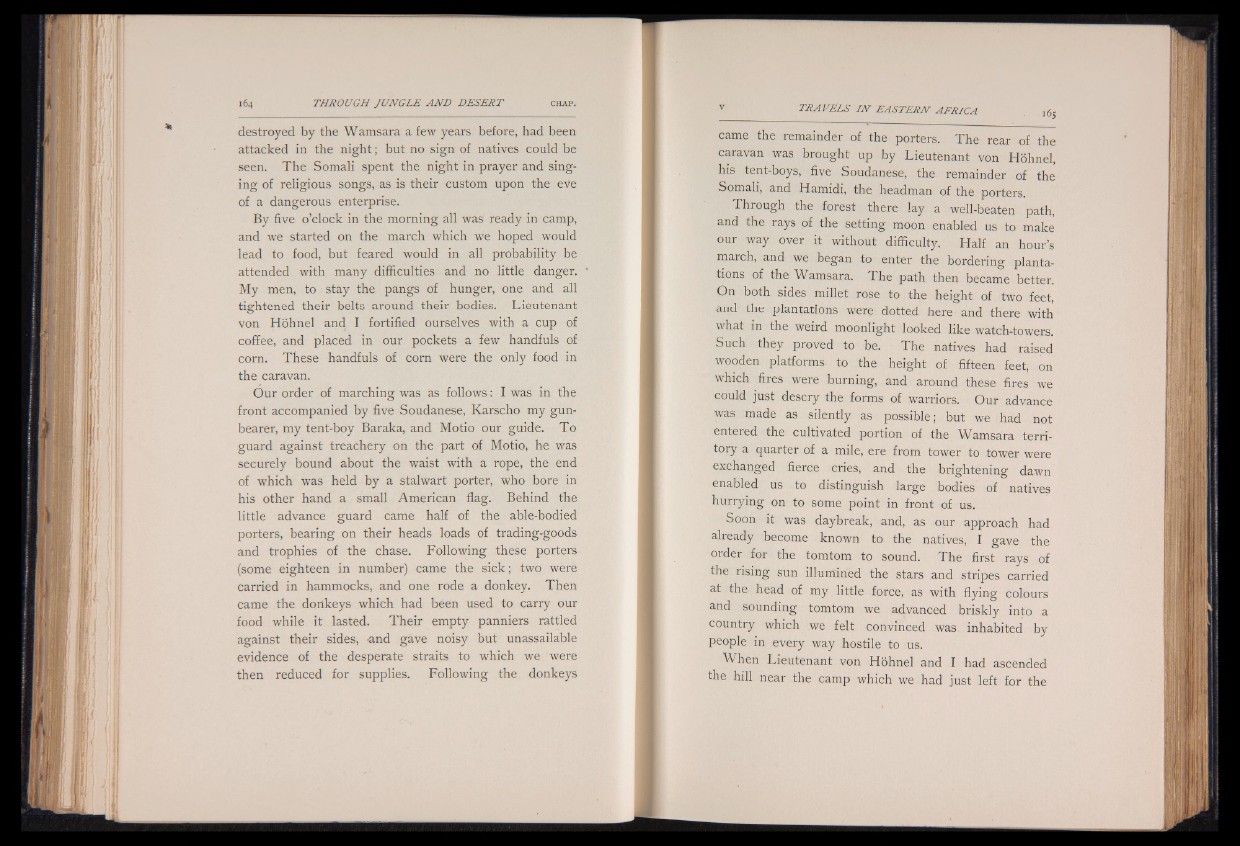
destroyed by the Wamsara a few years before, had been
attacked in the night; but no sign of natives could be
seen. The Somali spent the night in prayer and singing
of religious songs, as is their custom upon the eve
of a dangerous enterprise.
By five o’clock in the morning all was ready in camp,
and we started on the march which we hoped would
lead to food, but feared would in all probability be
attended with many difficulties and no little danger.
My men, to stay the pangs of hunger, one and all
tightened their belts around their bodies. Lieutenant
von Hohnel and I fortified ourselves with a cup of
coffee, and placed in our pockets a few handfuls of
corn. These handfuls of corn were the only food in
the caravan.
Our order of marching was as follows: I was in the
front accompanied by five Soudanese, Karscho my gun-
bearer, my tent-boy Baraka, and Motio our guide. To
guard against treachery on the part of Motio, he was
securely bound about the waist with a rope, the end
of which was held by a stalwart porter, who bore in
his other hand a small American flag. Behind the
little advance guard came half of the able-bodied
porters, bearing on their heads loads of trading-goods
and trophies of the chase. Following these porters
(some eighteen in number) came the sick; two were
carried in hammocks, and one rode a donkey. Then
came the donkeys which had been used to carry our
food while it lasted. Their empty panniers rattled
against their sides, -and gave noisy but unassailable
evidence of the desperate straits to which we were
then reduced for supplies. Following the donkeys
came the remainder of the porters. The rear of the
caravan was brought up by Lieutenant von Hohnel,
his tent-boys, five Soudanese, the remainder of the
Somali, and Hamidi, the headman of the porters.
Through the forest there lay a well-beaten path,
and the rays of the setting moon enabled us to make
our way over it without difficulty. Half an hour’s
march, and we began to enter the bordering plantations
of the Wamsara. The path then became better.
On both sides millet rose to the height of two feet,
and the plantations were dotted here and there with
what in the weird moonlight looked like watch-towers.
Such they proved to be. The natives had raised
wooden platforms, to the height of fifteen feet, on
which fires were burning, and around these fires we
could just descry the forms of warriors. Our advance
was made as silently as possible; but we had not
entered the cultivated portion of the Wamsara territory
a quarter of a mile, ere from tower to tower were
exchanged fierce cries, and the brightening dawn
enabled us to distinguish large bodies of natives
hurrying on to some point in front of us.
Soon it was daybreak, and, as our approach had
already become known to the natives, I gave the
order for the tomtom to sound. The first rays of
the rising sun illumined the stars and stripes carried
at the head of my little force, as with flying colours
and sounding tomtom we advanced briskly into a
country which we felt convinced was inhabited by
people in every way hostile to us.
When Lieutenant von Hohnel and I had ascended
the hill near the camp which we had just left for the